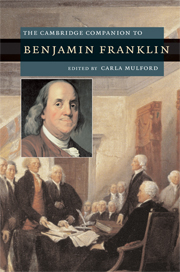Book contents
- Frontmatter
- Introduction
- 1 Benjamin Franklin’s library
- 2 The Art of Virtue
- 3 Franklin’s satiric vein
- 4 Franklin in the republic of letters
- 5 Benjamin Franklin’s natural philosophy
- 6 Franklin and the Enlightenment
- 7 Franklin and the question of religion
- 8 The pragmatist in Franklin
- 9 Franklin on national character and the Great Seal of the United States
- 10 Protestant ethic or conspicuous consumption? Benjamin Franklin and the Gilded Age
- 11 Benjamin Franklin and the American Dream
- 12 Benjamin Franklin’s Autobiography, then and now
- Further reading
- Index
9 - Franklin on national character and the Great Seal of the United States
Published online by Cambridge University Press: 28 January 2009
- Frontmatter
- Introduction
- 1 Benjamin Franklin’s library
- 2 The Art of Virtue
- 3 Franklin’s satiric vein
- 4 Franklin in the republic of letters
- 5 Benjamin Franklin’s natural philosophy
- 6 Franklin and the Enlightenment
- 7 Franklin and the question of religion
- 8 The pragmatist in Franklin
- 9 Franklin on national character and the Great Seal of the United States
- 10 Protestant ethic or conspicuous consumption? Benjamin Franklin and the Gilded Age
- 11 Benjamin Franklin and the American Dream
- 12 Benjamin Franklin’s Autobiography, then and now
- Further reading
- Index
Summary
For my own part I wish the Bald Eagle had not been chosen as the Representative of our Country. He is a Bird of bad moral Character.
Benjamin Franklin, letter to his daughter, Sarah Bache, January 26, 1784Character was a preoccupation of men in Britain and colonial America throughout the eighteenth century - not only the character of the individual men in prominent roles within each community, but also the character of entire nations in evidence in their manners. Reputation was a vital factor determining one's place in British colonial hierarchy, the society in which Benjamin Franklin was raised and entered public life long before the American Revolution. Yet, Franklin, who worked as the printer of The Pennsylvania Gazette, was not a “gentleman” in the eighteenth-century sense of a man who did not need to work for a living, a man of leisure. Even after he had retired from publishing The Pennsylvania Gazette, his opponents criticized his class origins and resources. Finding himself vilified during the mid-1760s, for example, he assured himself and his allies, when writing that “Dirt thrown on a Mud-Wall may stick and incorporate; but it will not long adhere to polish'd Marble” (P 13: 488). Subsequently, at times, he sought to cultivate an image of his own character as a gentleman worthy of leadership in British America.
Franklin was likewise preoccupied with the perceived national character of the new United States in evidence in its manners. In his various pictorial representations of British America over the decades, one constant was his emphasis on the character of the American community, character that he hoped his works would assist in imparting to his audience. Franklin's concern with national character shaped his emphatic rejection of the bald eagle as the new nation's symbol on the Great Seal of the United States.
- Type
- Chapter
- Information
- The Cambridge Companion to Benjamin Franklin , pp. 117 - 131Publisher: Cambridge University PressPrint publication year: 2009



